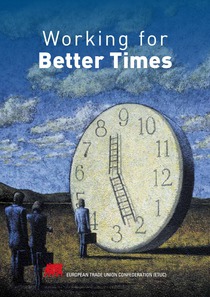Working for better times. Working time regulation and innovation in the 21st century: report of ETUC Conference
"Decent working time has been a core trade union demand for the last century and is a fundamental right. In January 2011 the ETUC held a conference on working time ‘Working for Better Times’ to disseminate good practice on working time and also to initiate the second working time award. The con...
| Main Author: | |
|---|---|
| Institution: | ETUI-European Trade Union Institute |
| Format: | TEXT |
| Language: | English |
| Published: |
Brussels
2010
ETUC |
| Subjects: | |
| Online Access: | https://www.labourline.org/KENTIKA-19306217124911244999-Working-for-better-times.-Work.htm |
| Summary: | "Decent working time has been a core trade union demand for the last century and is a fundamental right. In January 2011 the ETUC held a conference on working time ‘Working for Better Times’ to disseminate good practice on working time and also to initiate the second working time award. The conference was planned by the ETUC with the European Trade Union Federations (ETUF) in the services sector, the metal sector and the public services (UNI, EMF and EPSU). The two-day conference was attended by 121 representatives from trade unions confederations, European Industry Federations, employers’ organisations and the European Commission. The conference addressed the potential conflicts of interest with regard to the health and safety needs of workers, and the need to balance the flexibility required by employers and with the security for workers. The key questions underpinning the conference relate to how trade unions can meet the challenges to accommodate the modern needs of workers and companies with regard to the organisation of work, the reconciliation of work and family life, the demands of an ageing workforce, employment and productivity, in the context of the pressures resulting from globalisation and the economic crisis. The conference sought to inspire new approaches to regulation and practice, and to examine the conditions that are necessary to have positive outcomes for all stakeholders. While many Member States have already developed modern and flexible approaches, there is an overriding need for a strong regulatory framework to underpin working time developments and in providing the social partners with the scope to collectively agree new and innovative approaches to working time." |
|---|---|
| Physical Description: | 51 p. Digital Paper |

